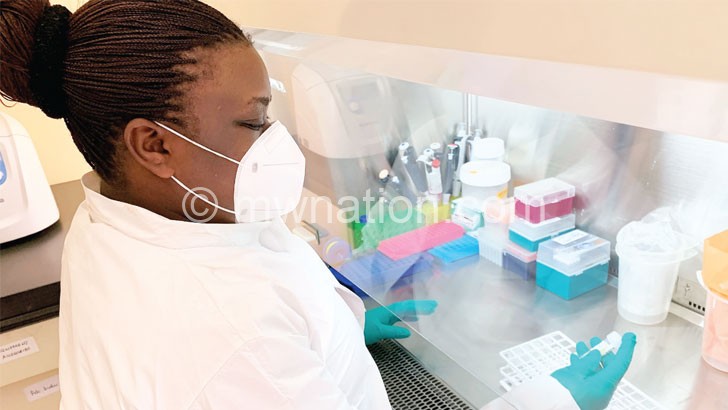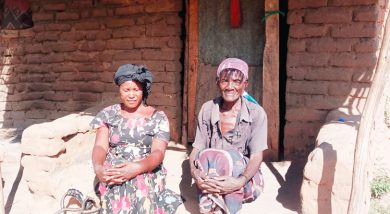‘Every sample is critical’
In this article, LULUTANI TEMBO, from Unicef, profiles a selfless frontline health worker at war with Covid-19.
Dr Wa t i p a s o Kasambara reports to work at the National Microbiology Reference Laboratory in Lilongwe every day at 7.30 am.
Most employees in Malawi knock off at 5pm, but this is not the case for the 36-year-old doctor. Since Malawi confirmed its first case of coronavirus disease (Covid-19) on April 2, the earliest she has clocked out is 7pm.
“Sometimes, I leave work at 10.30 or 11pm. I don’t have a weekend anymore, and I couldn’t celebrate Easter. In fact, I didn’t realise it was Easter Monday until someone mentioned i t , ” she explains. “Each sample is critical; each sample is an emergency, so you have to make sure people who have been tested get their results the same day.”

No time to rest
Kasambara has been working around the clock, testing people for coronavirus. When the country’s first case was confirmed on April 2 in Lilongwe City, she went to collect the samples from the affected family.
“I was scared, but someone had to step up and do it for the country— and I did,” she says with conviction. “I was afraid because we didn’t have much information on Covid-19 at the time. I had to put on the right personal protective equipment so I didn’t expose myself. When we got the first positive result, it wasn’t easy and we had so many things to think about.
“We were asking ourselves: How do we report this? How will the family take it? How will the government take it? It was really hard, but we needed to be brave.”
Selfless worker
K a s a m b a r a h o l d s two master’s degrees in microbiology and a doctorate in environmental health from the University of Kwazulu Natal in South Africa.
The antimicrobial resistance coordinator at the national laboratory has been has been heading the lab for the past seven years.
Today, she is among selfless frontline health workers helping the country fight coronavirus while putting their own health at risk.
She explains: “I feel proud that I am in the forefront, helping the country face this national challenge.
“If I die today, I will die a happy person because I have done my part. I have spent sleepless nights. We [health workers] do a lot, giving diagnostics results that can save lives and our country.”
Covid-19 tests
Malawi initially had no Covid-19 testing capacity.
Thanks to funding from UK Aid, Unicef supported the Ministry of Health to calibrate existing reverse transcription-polymerase chain reaction (RT-PCR) system to do the first Covid-19 confirmation tests.
This is one of the most accurate laboratory methods for detecting, tracking and studying the novel coronavirus.
“We’re able to do Covid-19 tests in the country, which otherwise would have been done in South Africa. With the lockdown, we would’ve been in big trouble had UK Aid not stepped in to support us,” Kasambara explains.
Furthermore, five professors were trained in testing and they played a role in determining the first three cases in Malawi.
“Additionally, Unicef, through UK Aid funding, has assisted in procuring an additional RT-PCR system, which can test 368 samples while the machine we’re currently using tests 96 samples,” she says.
Other development partners have also provided testing kits and other laboratory supplies to ensure the tests are done in Malawi.
This includes the US Centres for Disease Control and the Jack Ma Foundation through the World Health Organisation (WHO).
Currently, they do about 25 to 50 tests a day.
The patients that they have taken samples from reported to experience different symptoms.
“For the positive cases, some had a dry cough, body weakness and a sore throat. Some have also had diarrhoea and malaria-like symptoms. We’ve hardly had any cases of patients having difficulties with breathing,” she states.
When patients test positive, Watipaso and her team go back to do a second test on positive patients after 14 days, and again after 48 hours.
She explains: “The country has been fortunate to have more recoveries than deaths. I am happy when there are recoveries.
“In Kaliyeka township in Lilongwe, a six -year-old girl, a teenager, even an elderly person recovered. Parents should also explain this virus to their children and give them hope.”
Work vs family
Informing peop l e of their Covid-19 test results is always a difficult challenge for Kasambara.
“Some people are very unwilling to hear their positive results. It hasn’t been easy. There was a situation when we had to request assistance from other authorities to help us make patients with confirmed cases understand that they have coronavirus,” the microbiologist explains.
She calls for more civic education so communities are well informed about the virus.
With such a hectic job, Watipaso’s family life has not been the same. When she gets home late at night, she disinfects her shoes and clothes. She tests herself regularly to make sure she doesn’t infect her two children.
She says: “My kids complain every time that they miss me. My husband is helping to look after them.
“Health workers are working hard day in and day out and doing their best. There are days that I go without eating because of the stress that comes with the work.”
Malawi has recorded four deaths from about 83 cases, but the number is expected to rise with more testings.
Kasambara believes the virus can be contained if people regularly wash hands with soap and practice social distancing.





